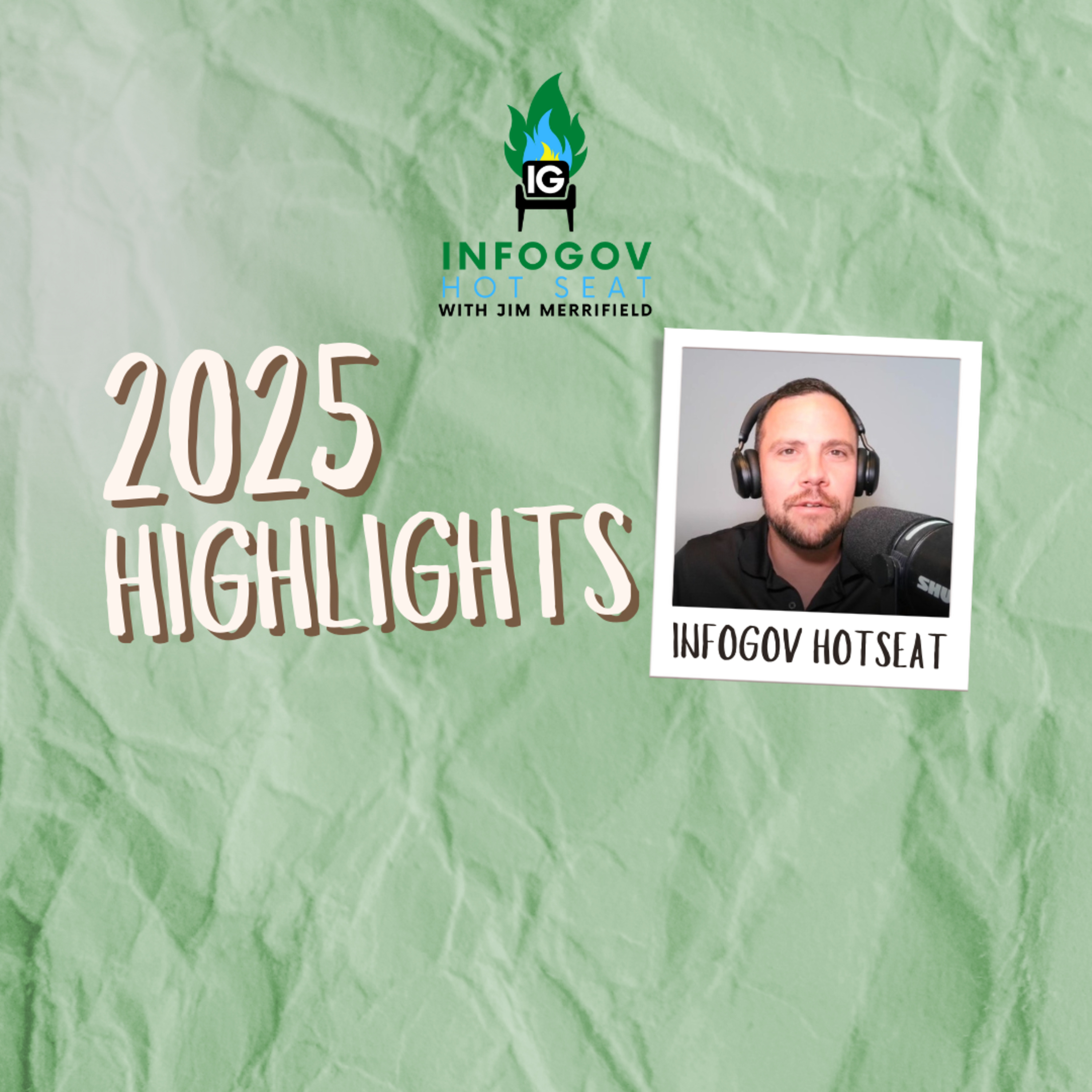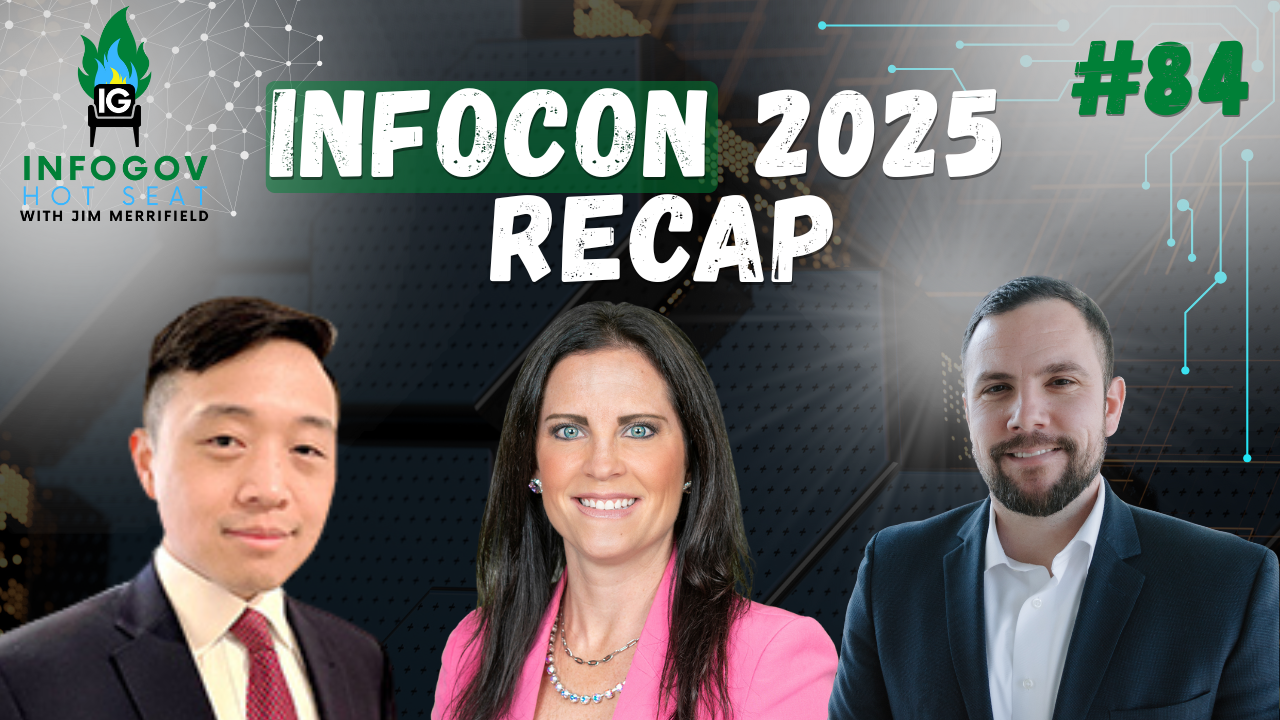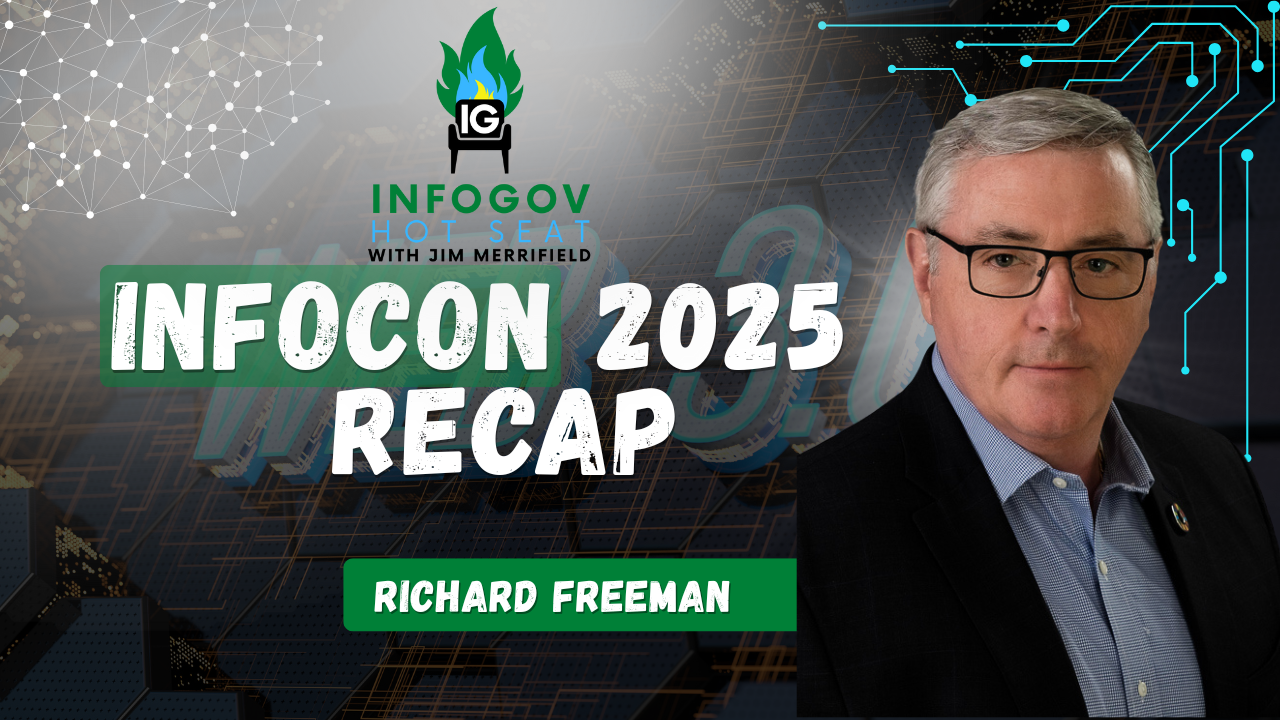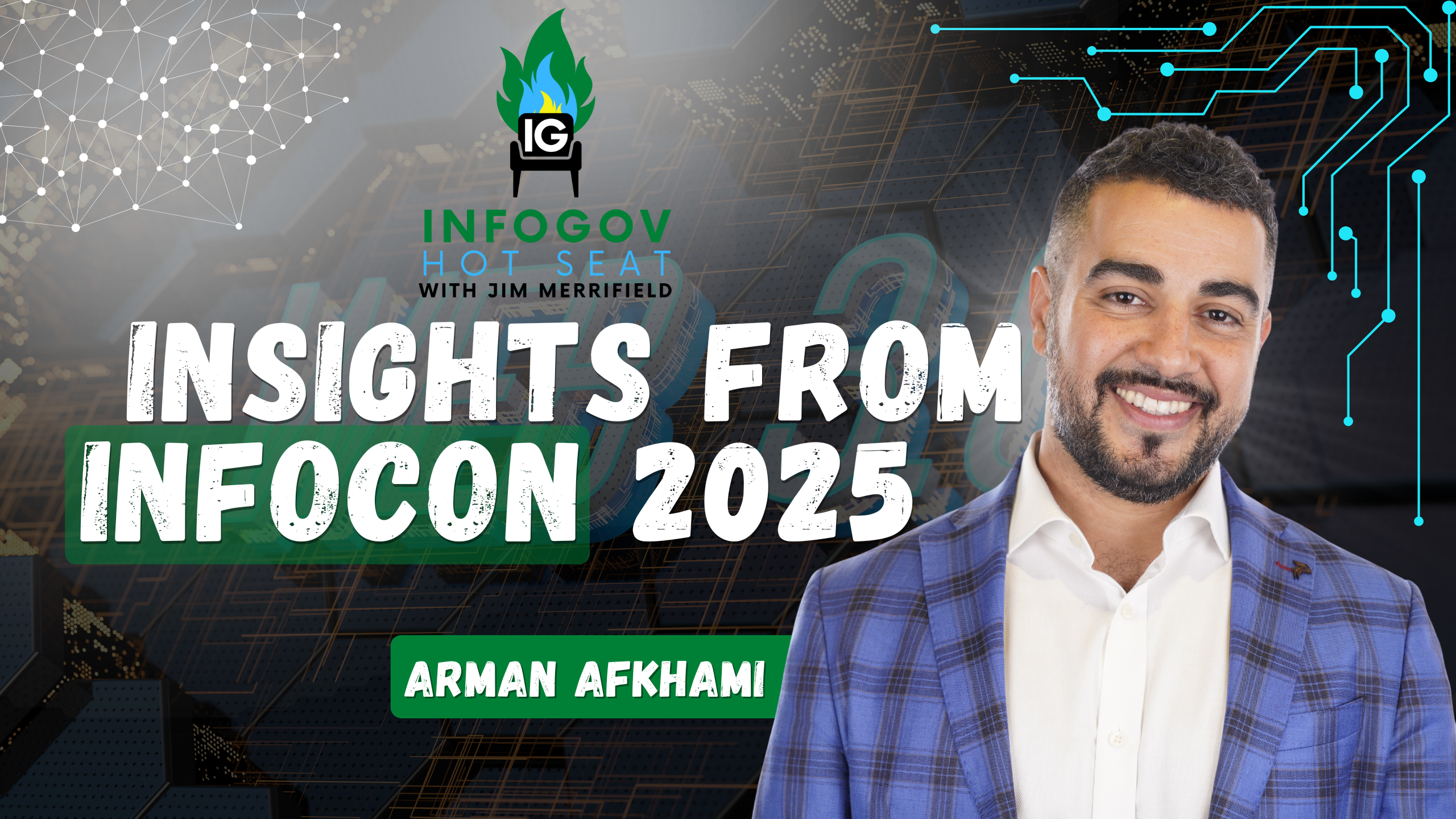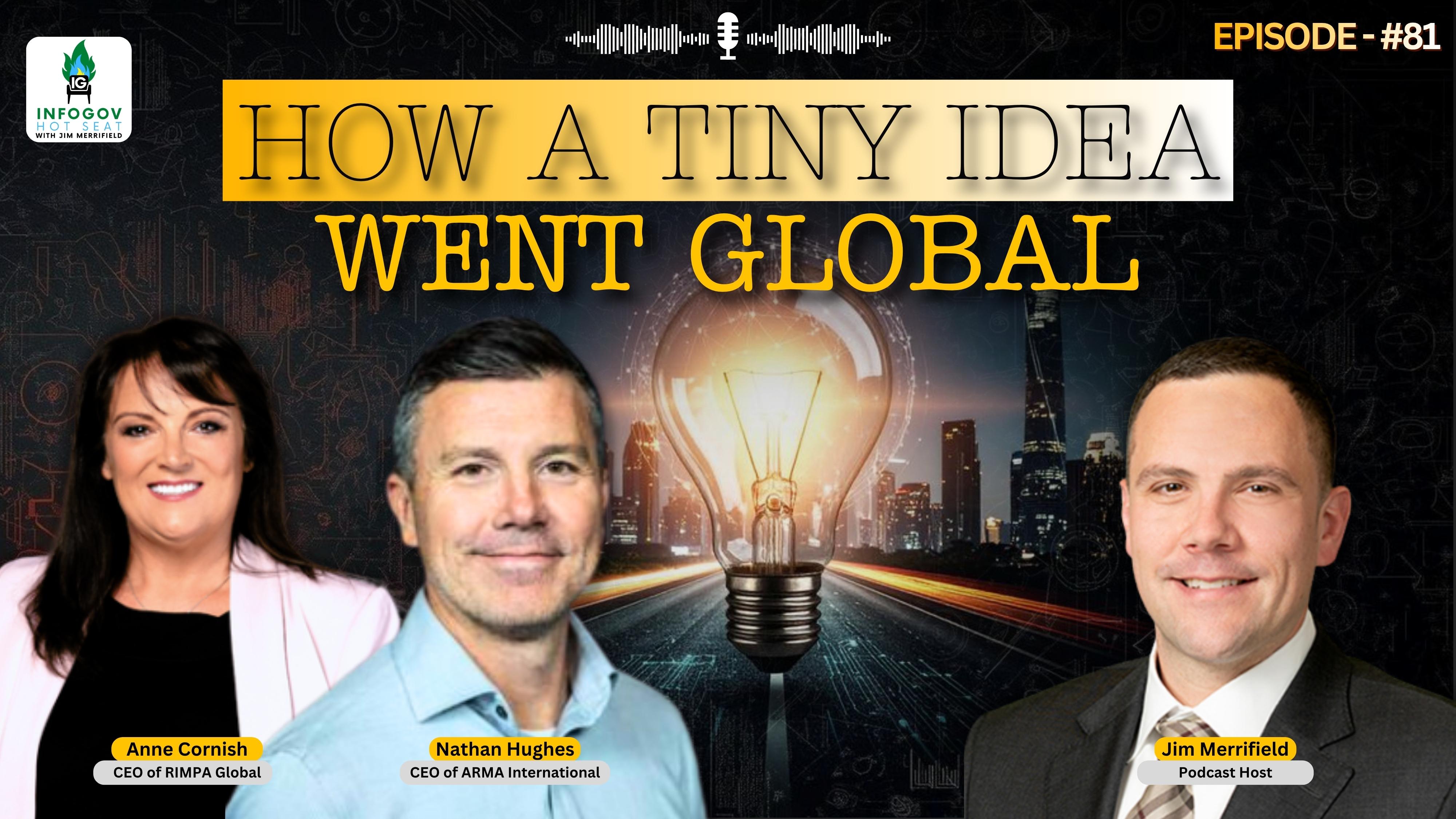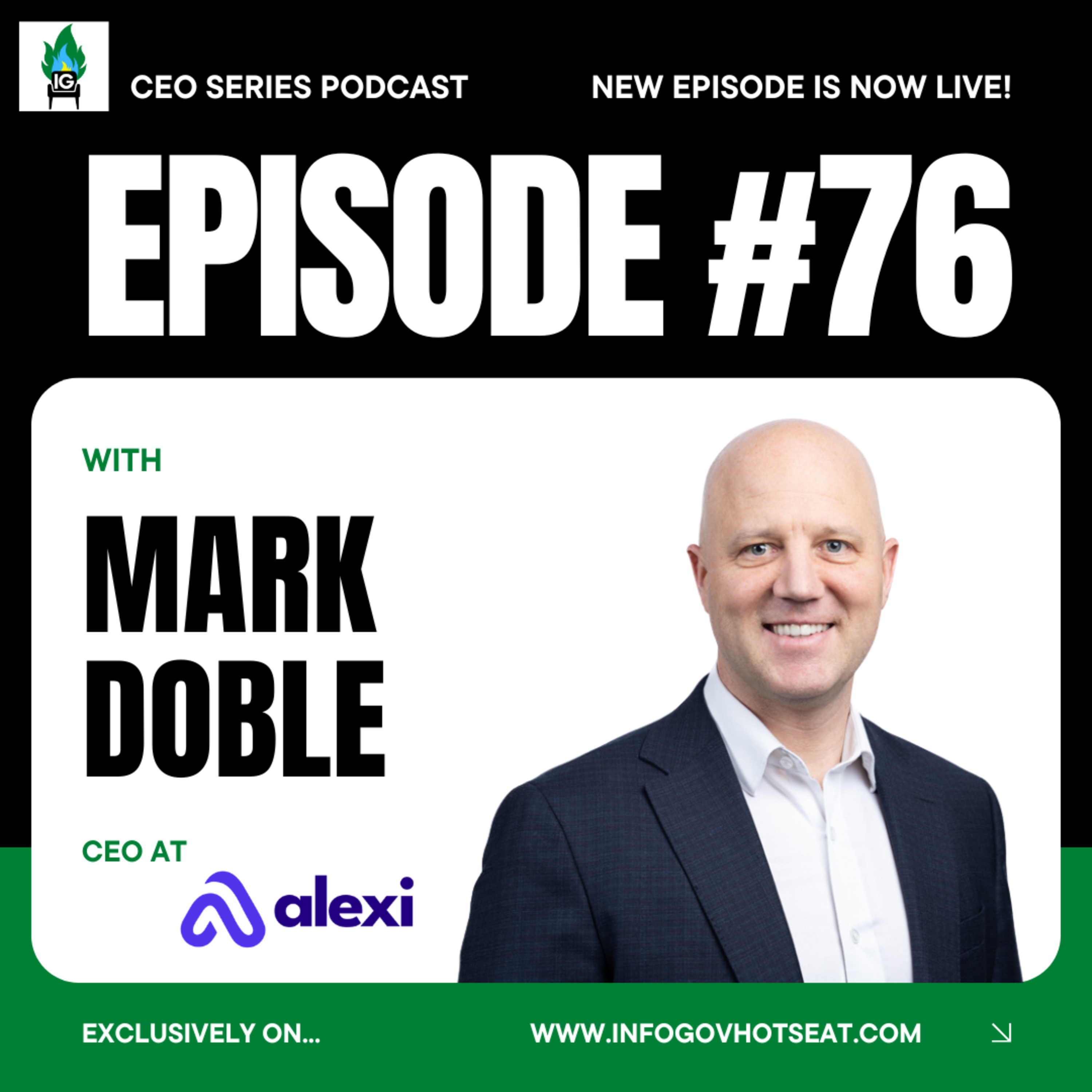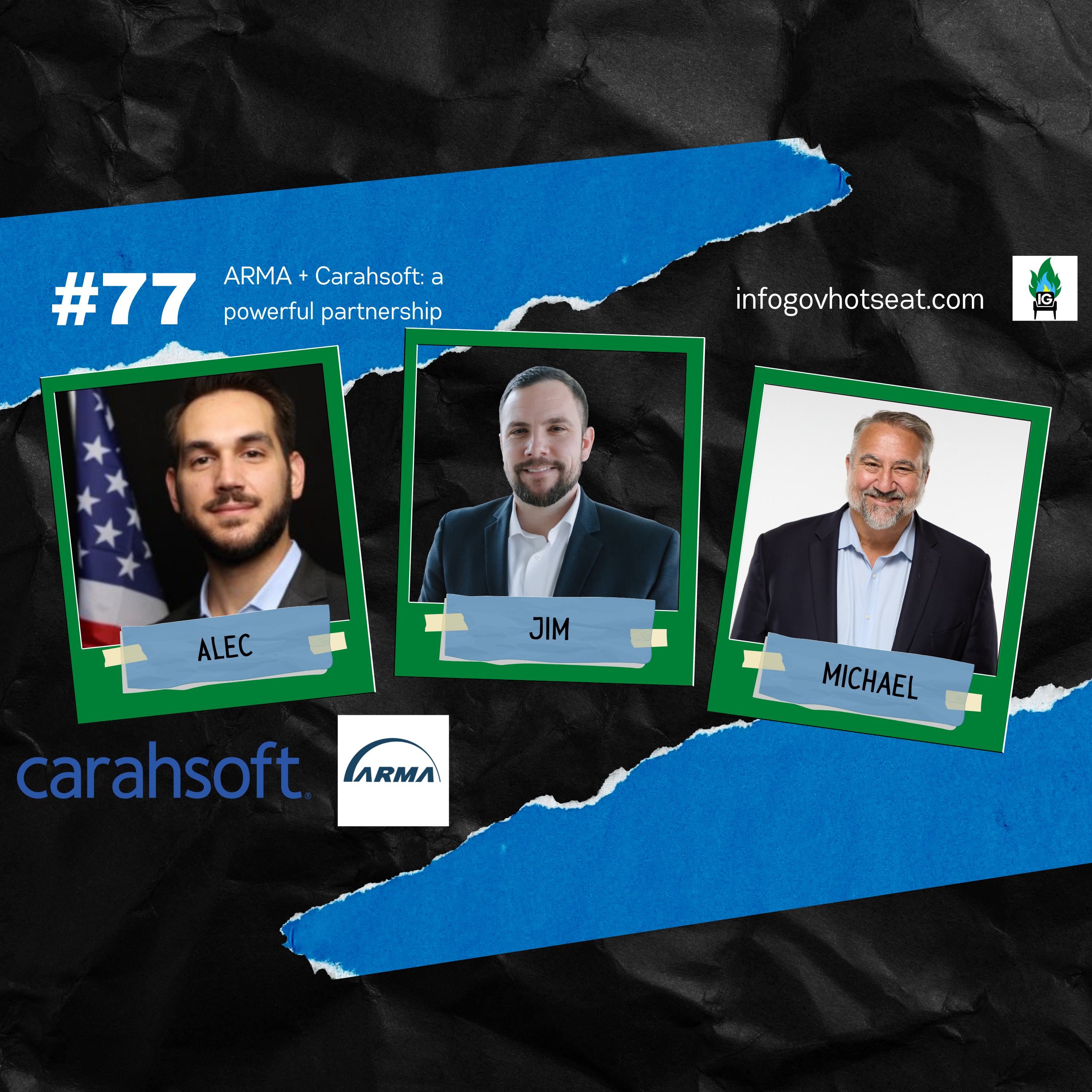IGHS8 - Interview with Christopher Hockey, Director of InfoGov

This episode features Christopher Hocky at Bond, Schoeneck & King. Tune in to hear his answers to these 5 burning questions:
- Recently you posted an interesting topic on Linkedin related to the growth of digital data and its impact on information governance , can you expand on that a bit?
- What projects are priorities for you this year?
- What does your internal InfoGov team look like? Where do you see opportunities for growth?
- Which InfoGov events do you plan on attending/speaking at this year?
- Where do you see the InfoGov industry in 3-5 years?
Jim Merrifield:
Hello and welcome to the InfoGov Hot Seat. I'm your host Jim Merrifield and with me today is Christopher Hockey, Director of Information Governance at Bond. Welcome, Chris.
Chris Hockey:
Hey Jim, good to be here. Happy to have a conversation about IG. I've never been on a hot seat before, so I'm super excited.
Jim Merrifield:
Yeah, it's awesome. I'm glad you took time out of your day and I promise I'll be nice and brief to the point. I won't ask you too many uncomfortable questions, but here's my first one. To start off, let's get to know you a little bit. A brief introduction of your role, how long you've been in the field of records management and then one fun fact about yourself.
Chris Hockey:
All right, so my current role at Bond is director of information governance and management, which really evolved when I initially took the role, it was director of records and enterprise content. And a lot of people were like, well, what is that? And I could see that the industry was heading more towards this information governance. And so I pleaded to have a title change. And so, but yeah, I mean, generally what my role at Bond is to really oversee the firm's records, data, information. I oversee our research and information services department, which does all of our, basically, kind of our library services, if you will. I’ve been in records since 2000.
When I started in 2016 it was actually in higher education so I had spent about 30 years in higher ed and my last role in higher education was as the director of registration and records at a local community college here in Syracuse. So I did that for three years I was ready for a change and that's when I saw the position at Bond and was super excited. I knew Bond, I was So I was excited to move into that kind of role. So I've been with Bond since 2019.
And the fun fact is that, so this would have been, I think it was probably my senior year of college. So I won't give the year away, but it was my senior year of college. And some buddies and I were headed to a concert. Before the concert we decided to go out to go out to dinner to local restaurant and wouldn't you know that Weird Al was at the same restaurant that we were at and the restaurant was empty. There was nobody there. It was like this kind of hole in the wall restaurant that we knew locally because you know we all grew up here and he must have heard that it was a hole in the wall and no one would be there and so he could have some privacy. So you know we are big, big, big fans. And he said, oh, why don't you guys sit down? I'm about to have dessert. You guys want to have dessert? And so, yeah. We sat down. We had dessert with Weird Al' Yankovic, super, super funny guy, as you would imagine him to be. But really down to earth. I mean, just a super casual, like, made us all feel like, you know, really just comfortable, you know, like, oh, my, this is not some big celebrity. Which he was for us, because we loved Weird Al. But he was just a really, really, nice guy just what you would imagine him to kind of be so that's my fun fact.
Jim Merrifield:
That's awesome. I love it. Yeah, did he have that big couch? Could he fit that big couch into the restaurant?
Chris Hockey:
No, he didn't. But I'll tell you what, it's one of the best concerts that I've ever been to. I mean, the amount of stage production that goes into his concert in terms of props and sets and costume changes and it was definitely not what I expected. It was way better than what I thought it would be. It was just awesome.
Jim Merrifield:
Yeah, that's awesome. Thanks for sharing that and also sharing your current role. It seems like you got a lot on your plate and doing some really cool things at Bond. So thanks for sharing that.
Now, recently you posted a LinkedIn post and it was related to the growth of digital data, its impact on information governance. Can you expand on that a bit? Cause I thought that was a really interesting topic.
Chris Hockey:
Yeah, I mean, I think what I wanted to kind of get across was that we're seeing massive amounts of data accumulation right now. I think one of the stats that I found was that by 2020, there was 64.2 Zeta bytes globally of data. And, you know, over 70% of that is unstructured, right? So, what I was trying to convey was as practitioners in information governance and records management, we can't lose sight of this massive impact. I mean, I don't think that people really grasp how quickly we are accumulating data, how fast it is growing, and how so much of it is in that unstructured format, which means that it's very difficult to wrangle and to get your arms around. But the other thing that I thought was important highlight was just the value of that data if you are able to harness it. So one of the other stats that I found in preparing for this was that in 2021, over 3 million emails were sent every second and 67% of those were spam. And I think our jobs as practitioners in IG, we have to help our constituents separate the value from all the noise, right? And so when you've got over 3 million emails and 67% of those are spam, that's a lot of noise that you've got to sift through, right? And so it's wanting to convey that we need to do a better job of pushing the importance of harnessing our data and the type of value that we can get out of that. But in order to do that, we have to put in place policies, practices, and procedures around our data and our information.
Why bother collecting all of this data if you're not going to leverage it in some capacity, then it just becomes noise or taking a records management term, it becomes Rot. It just becomes stuff that is there and it's just taking up space. When you're searching for something, you're getting all of this extraneous stuff that becomes part of your search results that really doesn't need to be there. You know, the Aberdeen group looked at kind of impact of data in terms of organizations leverage that data. And they found that by effectively governing and ensuring the accuracy of the data they can actually improve over their competitors. So, if you're in a place where you're not only managing it, but you're finding ways to leverage it, to gain insights, which ultimately leads to better decision making, you're setting yourself up for a much more competitive business advantage over your peers. And I think as, you know, those of us that are in charge of this role, in charge of information it's our job to, I think, to help our constituents see that, that there is, beyond just keeping things neat and tidy, there's value in leveraging the insights that you can get from all of this information. We get into, business analytics and data,dashboards and all this other kind of stuff. And I think we're still quite a way away from that being kind of the standard. I don't think we're quite there yet. But it was really kind of what I was trying to get people to kind of think about and talk about.
Jim Merrifield:
Yes, those are some valuable insights. I think what you're talking about is a prime conversation with all the AI conversations around ChatGPT and most firms have a director of knowledge management. You probably have your projects all lined up hopefully for the year. What is top of mind for you this year?
Chris Hockey:
Yeah, so for me, one of the things that my department is working on is we just launched ICompli for our records management system and right now we're going through the process of integrating that with iManage because we're an iManage shop. And so because we really want to give our attorneys and our staff kind of a one-stop shop for all of their information and records. So we want to give them one place they can go where they can see, here's all the physical you have for this matter, here's all of the electronic documents that you have for this matter. And eventually we're going to tie that into our file shares. We're going through a process now of restructuring our file shares so that they're matter-centric. And then we'll link that in as well. So, we like this idea and we're excited about the opportunity to have our attorneys be able to go one place to see everything that they have. And it also helps us administratively because we have one place, that we can apply retention and when it's time for destruction we know what we have around all of that. So, that's one project.
The other project we're going through now is our email management project. We’re looking to apply a retention policy to our email and really get people used to filing their emails because again, I talked about how many emails are getting generated on a daily basis and probably more so for attorneys.
Jim Merrifield:
Yes, that’s very true.
Chris Hockey:
So those emails are records, and they're part of the record and there's valuable insight and data there. And so, we're going through the process now of doing a one-on-one partnership with our attorneys to help them get comfortable with filing their emails and using our document management system as a place where they can interact with and find their emails as opposed to using Outlook, which is more of a transitory product and not necessarily a record system. So, these are really the two big things that we have got going on right now.
Jim Merrifield:
For sure, and those are big projects! You're not going to tackle those on your own, right? So, let's talk about your team a little bit.
Chris Hockey:
For sure.
Jim Merrifield:
Yeah, so your internal team, what does it look like and where do you see some opportunities for growth? Because our teams are constantly probably getting bigger and bigger with these projects, right, hopefully.
Chris Hockey:
My team is great. I love them. They're fantastic. They're a real bunch of go-getters. I have two staff members that are electronic records coordinators. And so, they're really overseeing the day-to-day matter mobility, dealing with our support tickets for iManage, iCompli, and helping with anything electronic records related. They are in there and doing that work. I have a data governance coordinator and she's really my kind of Jane of all trades, if you will. She's got SQL experience and knows how to work with APIs and scripts, and I know none of that stuff. So, it's great to have her on the team because as we deal more and more with this data, I need someone that really knows how to work with it in that capacity. And then, as mentioned, I oversee our research information services department. So, we have our manager of research information services, and then we have a reference librarian. And so, we kind of work hand in hand in terms of helping the attorneys. Get the research information they need to do their job and I'm helping them find internal content that they need to do their job.
I have a great team and I think areas for growth would be good for us to build more on our physical records because we are still moving very much towards electronic matter file. We've started, restarted our sustainability committee this year, which is really focused on going paper light. And so we're encouraging our attorneys and staff to focus more on electronic records and less on paper. But we still have a lot of paper. So, I think that's still an area that we need to address in some capacity. And I think we're exploring some different ways to make sure that records management is getting done efficiently. But I think aside from that, one of the things that I look forward to is while my data governance coordinator is certainly familiar with analytics, she doesn't really have the time to do that because she's more focused on the policies, practices, making sure that our data is accurate and clean. So, I think having someone that is focused on data analytics would be beneficial.
Jim Merrifield:
I think that's great! Similar to what a financial analyst does on the financial side. You sure do have a great mix of individuals and several forward-thinking ideas.
Chris Hockey:
Exactly. Thank you!
Jim Merrifield:
So let's talk a little bit about events. Every year there's tons of information governance events to attend, to speak at, Of course, we can't go to all of them as we’dlove to. We got to get some work done. So what events are you planning on being at or speaking at? What's your plans for 2023?
Chris Hockey:
So, ILTA is definitely on the main agenda this year. So, when I started at Bond, I started in 2019. And by the time the ILTA conference rolled out for 2019, we were in COVID. So, my boss, with me being new to legal at that time, wanted me to engage with the ILTA conference. So, I went to the virtual ILTA conference. And I still feel very salty that I didn't get the real ILTA conference. So obviously, with a large IT department, you've got to rotate your people around ILTA. So, I made a point to tell them look this year I need to go to ILTA because I didn't really get the good experience. You know part of the real benefit of going to the ILTA conference is the face-to-face, “water cooler” conversations that take place outside those sessions which you don't get in that same kind of virtual environment. And so for me, ILTA is really front and center. I'd like to try to attend the ARMA conference as well. I'm not looking at presenting just yet on anything. I feel like there's a couple of things I want to accomplish. So,I have something to present on, but that's always something I do like, presenting. It's just feeling like, what do I have that hasn't already been done? That's kind of where I'm at right now. So, but yeah, looking forward to definitely going to ILTA and hopefully fingers crossed I can hit ARMA as well.
Jim Merrifield:
Yeah, for sure. I'll see you at both those events. And hey, you're presenting right now, Chris. I mean, you're giving us some valuable information. So don't sell yourself short there. You know, there's definitely some valuable information in this conversation. So, thanks for that.
Chris Hockey:
Yes, that’s true. Thank You!
Jim Merrifield:
So, let's fast forward into the future. Where do you see, records management, information governance over the next three to five years? How do you see things developing? I know there's a lot of things changing this year, right? With AI, with ChatGPT, with all the privacy regulations, there's a lot going on. So what do you see in your crystal ball?
Chris Hockey:
You know, it's interesting. I've always been very comfortable with the unknown, right? And kind of not knowing where things are going to go and trying to stay ahead of technology trends. But this is a really interesting time, especially with the AI piece. I mean, it's just really hard to predict where things are going. I do think that you can't escape it, right? I think that that's been something that I think has been talked about in communities that I'm in is that you can't escape the AI piece. There's going to be firms that use it and firms that don't use it, but the firms that don't use it are simply just not going to compete as well as those that use it. I know there's a lot of apprehension about it. And I think we have to help our constituents figure out the best way to leverage it. So, I definitely think AI has thrown kind of wrench into where we see ourselves. I think even trying to project even three years out is a challenge because the pace of technology today is just so fast.
But I do think that especially with the amount of data breaches that we're seeing, the cybersecurity attacks, I think that needs to be front and center for any organization to make sure that you've got policies, protocols, procedures in place to not only mitigate that, but to make sure that you are prepared for it. I think there was somebody somewhere that said, you may not think that you've nt been hit, but you've probably been hit and just don't know it yet, right? And I think there's some level of truth to that, right? It may not be some of the big attacks that we've seen, but to some degree, I think they're through just normal data loss or internal loss of information. I think that there's just so many avenues where we have to help mitigate that risk. And I think those are the areas that really need to be focused on the most in the next year or so. Bad actors are only getting better at what they do. And frankly, I'm not saying anything here that isn't known, but law firms are traditionally slow to adjust to technology. And I think that is something that we need to help with. Those of us that are comfortable with tech and comfortable with data, we have to help them get to a place where we're doing a better job of protecting our organizations.
Jim Merrifield:
Yeah, these are certainly exciting times for us as information governance professionals, right? We definitely have a bright future. And I don't think there's going to be any shortage of things to do at our organizations.
Chris Hockey:
Absolutely.
Jim Merrifield:
Listen, Chris. Thanks so much for joining me today. This was awesome sharing all your insights with us on the hot seat. And thanks for taking the time out today. If you'd like to be a guest on The InfoGov Hot Seat like Chris, please submit your information through our website and thank you so much and enjoy the rest of your day.
Chris Hockey:
Thanks Jim, appreciate it.
Jim Merrifield:
You got it.

Director, Information Governance and Management
Dr. Christopher Hockey graduated from SUNY Oswego with a Bachelors in Political Science, concentrating on Public Policy and Administration. In his last year at SUNY Oswego, Chris served as Vice President for the student government. It was in this role that he discovered a passion for working in higher education and supporting college student learning and growth. Chris spent the next 17 years working in various administrative roles at Utica College, SUNY Oswego, SUNY System Administration and Onondaga Community College while simultaneously earning his Master’s degree in Higher Education Administration from Syracuse University in 2005 and an Ed.D in Executive Leadership from St. John Fisher College in 2015. Chris has also taught courses in public speaking and strategic communication in business. In 2019, Chris decided to explore new opportunities and challenges outside of Higher Education and found his way to Bond, Schoeneck and King, PLLC. Joining the firm in August of 2019, Chris serves as the Director of Information Governance and Management where he oversees Bond’s Information Governance program. He works with the Information Technology teams to improve operational efficiency and compliance capabilities and to maximize the Firm’s information resources. Chris’ responsibilities include: providing strategic direction for the Firm’s Document Management System, managing matter and records lifecycles, assessing and implementing the business needs of the practice and administrative groups and leading the Records and Information Management and the Research and Information Ser… Read More









